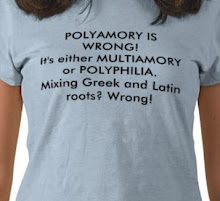I have for a long time wanted to write about the weakness in Utah's "Irrevocable" clause. The irrevocable clause was part of the text of Utah's Enabling Act - the document allowing Utah to achieve statehood. It was a craven compromise with the Mormons' enemies. Talk about "selling your birthright for a mess of potage." !!! Here we go - - -
At the time of Utah’s admission to the Union (1896), there was significant controversy regarding Mormon polygamy. The Church and its members were extremely reluctant to surrender the practice. The rest of the country probably had far more heartburn over Mormon power than Mormon polygamy. Federal officials doubted the sincerity of LDS leaders’ promises that plural marriages had been stopped. New polygamous unions may well have been ostensibly halted, but how many Latter-day Saint husbands were still living with their plural wives after the 1890 Manifesto? How could the government prevent polygamous courtships, polygamous ceremonies and ongoing polygamous family relationships?
Eventually, it became clear that, unless Utah agreed to include an anti-polygamy clause in its new state constitution, it would not be admitted to the Union. Here is the specific language from Utah’s constitution:
Article 3 Section 1 – The following ordinance shall be irrevocable without the consent of the United States and the people of this State: [Religious toleration -- Polygamy forbidden.]
First: – Perfect toleration of religious sentiment is guaranteed. No inhabitant of this State shall ever be molested in person or property on account of his or her mode of religious worship; but polygamous or plural marriages are forever prohibited.
On the surface, it would appear that those who drafted the language of the new state constitution did everything necessary to criminalize and eradicate polygamy from our state. Upon closer review, however, we find evidence of significant weaknesses. Here are some key failings:
1. If it was the intent of this clause in the (civil) constitution to enshrine the polygamy prohibitions in law, then statutes needed to be enacted to fully criminalize the practice. However, to this day, the words “polygamy” and “plural marriage” are nowhere to be found in Utah’s statutes (perhaps because their inclusion would have revealed the opponents’ naked desire to target a religious minority).
2. There are interesting ambiguities in the wording of the clause.
a. First let us look at the word “marriages”. If “polygamous” or “plural” marriages were “forever” to be prohibited, did this mean that the state was required to make sure that it would never grant anyone multiple concurrent marriage licenses? If so, then the objective was achieved. A sensibly-worded bigamy statute could accomplish this beautifully. Besides, one could count on one hand the number of polygamists who ever sought two marriage licenses in the last hundred years. If, however, by “marriages”, the framers really meant to say “weddings”, perhaps the clause should have read “polygamous or plural weddings” instead. Perhaps this is why additional statutes were written to punish individuals who participated in or “officiated” at purely religious “sealing” or commitment ceremonies (a felony). This was a particularly slippery fish to catch, so it required extraordinary statutory creativity.
b. Perhaps the word “marriages” was intended, rather, to apply to the condition of being “married” (like – “We had a wonderful wedding, and now we have a happy marriage). If this was the case, then the clause now runs afoul of the 2003 Lawrence decision because, once again, it attempts to prohibit couples or trios from acting “married”, even if the state provides no formal licensing of the relationship. Was there an intent to prohibit the mere relationship, and how could that be achieved in accordance with due process and equal application of laws?
3. Utah was placed in a rather unusual position. It could not attain statehood without bowing to federal demands regarding language in its constitution; in fact, the “irrevocable” clause states, “The following ordinance shall be irrevocable without the consent of the United States and the people of this State. This meant that, once Utah achieved the status of a State, it still would not have permission to remove this prohibition without federal approval. Later, Oklahoma was constrained (by the federal government) to agree to never relocate its capital (from Guthrie) as a part of its enabling act. Once a part of the Union, the capital was moved to Oklahoma City. When the controversial case (Coyle v. Smith, 1911) reached the U.S. Supreme Court, the Court ruled that, once Oklahoma had achieved statehood, it was no longer bound to honor an agreement imposed upon it by the federal government as a “condition” of statehood. Such a constraint would have caused Oklahoma to enter the Union on an “unequal”, lesser “footing” than the other states. Accordingly, Utah’s “irrevocable clause” (along with similar clauses in other states’ constitutions) is unconstitutional and should be voided.
Utah's feeble attempt to pay lip-service to religious freedom makes me prefer the religious freedom language of New York's 1777 state constitution:
"Every individual has a natural and unalienable right to worship GOD according to the dictates of his own conscience, and reason; and no subject shall be hurt, molested, or restrained in his person, liberty or estate for worshiping GOD, in the manner and season most agreeable to the dictates of his own conscience, or for his religious profession, sentiments or persuasion; provided he doth not disturb the public peace, or disturb others, in their religious worship."
-------------------------------------------------------------------------------
